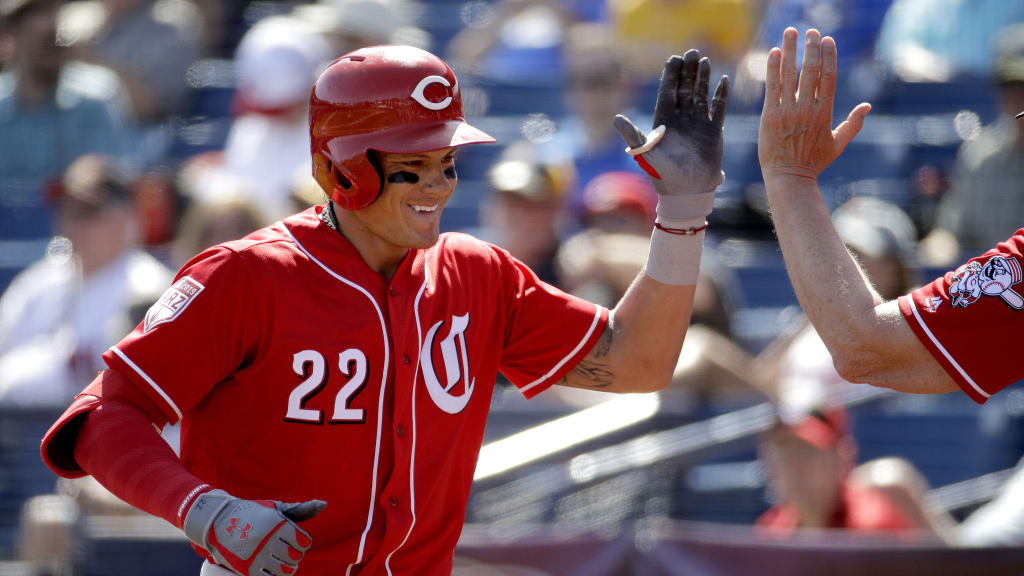
GOODYEAR, Ariz. -- In the roster-altering, rotation- and outfield-reinventing Reds’ offseason, the recent signings of Derek Dietrich and Jose Iglesias to Minor League contracts were decidedly unsexy acquisitions. But the Reds are serious about ascending in the National League Central after a 95-loss campaign, and these are the kind of moves that can elevate a club’s floor and protect it from the inevitable erosion that accompanies the 162-game schedule.
“They snuck in here,” manager David Bell said. “And I think their signings -- both of them -- are really important. I think it provides depth. I think they’re both [capable of being] everyday players.”
So … what’s up with those Minor League deals?
That MLB’s free-agent market is an unforgiving place for players north of 30 has become established fact. But Dietrich and Iglesias, both 29, were left out in the cold despite having assets -- Dietrich’s versatility, Iglesias’ glove and speed -- that are generally viewed as valued in the modern game.
Though Dietrich and Iglesias, both of whom were in Saturday’s lineup against the Rangers, wound up on the Reds via Minor League contracts, and a four-man bench leaves little roster wiggle room, there’s a really good chance both players stick.
So they’re not focused on the particulars of their pact.
“At the end of the day, your contract doesn’t dictate who you are,” said Iglesias, who will earn $2.5 million if he makes the roster. “And a contract doesn’t dictate where you’re going to end up.”
Dietrich, who will have a base salary of $2 million if he makes the roster, expressed much the same.
“[Minor] is just a word,” he said. “I know I’m a Major League player, I’ve always been a Major League player. I know I can contribute and continue to. For me, it was just about getting me in the uniform, and then it’s business as usual.”
Dietrich has been worth 4.3 Wins Above Replacement, per Baseball Reference, over the last three seasons. He is an option at first, second, third and in the corner outfield spots, and is coming off a season in which his offensive production rated north of the league average. He can conceivably give the Reds quality at-bats, and a little thump from the left-hand side. He’s also a pitch-magnet, having been plunked 21 times in 2018 alone.
The Marlins designated Dietrich for assignment last November, rather than going through the arbitration process with him.
“I don’t know what they’re doing, honestly,” he said of the Fish. “I don’t know if too many people do. But it’s not my problem anymore. I’m blessed to be where I am and am looking forward to helping this team win. I’ve always thrived on using my versatility and athleticism to help in all facets. It’s the same here in Cincinnati.”
Dietrich will once again be arbitration-eligible at the end of 2019, so this could be a multi-year stay with the Reds if things go well.
As for Iglesias, his glove provides a base value as a backup shortstop, and an option at second and third. Over the last three years, his Ultimate Zone Rating per 150 innings ranks third among shortstops, trailing only Andrelton Simmons and Francisco Lindor. He was worth 2.2 WAR last year.
“I see myself as a positive addition to this club,” Iglesias said. “I’m here to help this team in any single aspect that I can.”
The Reds addressed areas of need in the outfield and rotation in dramatic ways this winter. But a stronger bench -- and, ergo, a higher floor -- might be another reason to take them seriously in the Central.
“I think by adding those guys, they provide depth,” Bell said. “Most good teams I’ve seen, when you’re deep, you’re not losing anything, no matter who you’re playing off your roster. That’s what they provide for us.”


